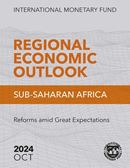At a Glance
- Current IMF membership: 191 countries
- Angola joined the Fund on September 19, 1989.
- Total Quota: SDR 740.1 million
- Budget summary tables drawn from the Government 2018 budget document
- Latest High Frequency Macroeconomic Data, May 2022 (Excel file)
Office Activities
-
Listen to the radio interview - available in Portuguese only.
November 14, 2023
-
Presentation by Mr. Eyraud at the Catholic University de Angola of the latest Regional Economic Outlook for Sub-Saharan Africa (português)
The IMF team comprised of Ms. Pattillo, Ms. Mossot, and Resident Representative Mr. Lledo was welcomed by over 110 participants: lecturers, professors and a majority of students.
November 1, 2023
-
Presentation of Fall 2023 Regional Economic Outlook at Museu da Moeda, Banco Nacional de Angola. (português)
The Governor of Central Bank, Deputy Governor of Central Bank, Minister of Finance, State Secretary for Finances and Treasury, Resident Representative of AFDB; from the IMF was Ms. Pattillo, Mr. Eyraud, and Resident Representative, Mr. Lledo participated in a panel discussion. PDF includes youTube link, photos, PPT presentation, and related media links.
November 1, 2023
IMF's Work on Angola
-
Growth in Sub-Saharan Africa is Diverging
November 14, 2024
Stagnating incomes in sub-Saharan Africa’s resource-intensive economies necessitate more effective fiscal management and broad-based structural reforms.
-
October 19, 2024
-
Angola: 2024 First Post-Financing Assessment-Press Release; and Staff Report
July 15, 2024
Series:Country Report No. 2024/224
-
Transcript of IMF Press Briefing
July 11, 2024
MS. KOZACK: Good morning, everyone, both to those of you here in person and those joining us online. Welcome to this IMF Press Briefing. I'm Julie Kozack, Director of the Communications Department. As usual, this briefing is embargoed until 11:00 a.m. U.S. Eastern Time. Let me start with some announcements and then I will take your questions in person on Webex and via the Press Center.
-
Post Financing Assessment (PFA) Consultation with Angola
July 3, 2024
The Executive Board of the International Monetary Fund (IMF) concluded the Post Financing Consultation (PFA) with Angola.
Regional Economic Outlook
October 25, 2024
Sub-Saharan African countries are implementing difficult and much needed reforms to restore macroeconomic stability, and while overall imbalances have started to narrow, the picture is varied. Policymakers face three main hurdles. First, regional growth, at a projected 3.6 percent in 2024, is generally subdued and uneven, although it is expected to recover modestly next year to 4.2 percent. Second, financing conditions continue to be tight. Third, the complex interplay of poverty, scarce opportunities, and weak governance--compounded by a higher cost of living and short-term hardships linked to macroeconomic adjustment--are fueling social frustration. Within this environment, policymakers face a difficult balancing act in striving for macroeconomic stability while also working to address development needs and ensure that reforms are socially and politically acceptable. Protecting the most vulnerable from the costs of adjustment and realizing reforms that create sufficient jobs will be critical to mobilize public support.
Read the Report
Fraudulent Scam Emails Using the Name of the IMF
We would like to bring to the notice of the general public that several variants of financial scam letters purporting to be sanctioned by the International Monetary Fund (IMF) or authored by high ranking IMF officials are currently in circulation, and may appear on official letterhead containing the IMF logo. The scam letters instruct potential victims to contact the IMF for issuance of a “Certificate of International Capital Transfer” or other forms of approval, to enable them receives large sums of monies as beneficiaries. The contact e-mail information is always BOGUS and unsuspecting individuals are then requested to send their personal banking details which the scammers utilize for their fraudulent activities.For more information please see Fraudulent Scam Emails Using the Name of the IMF
Departmental Papers on Africa





